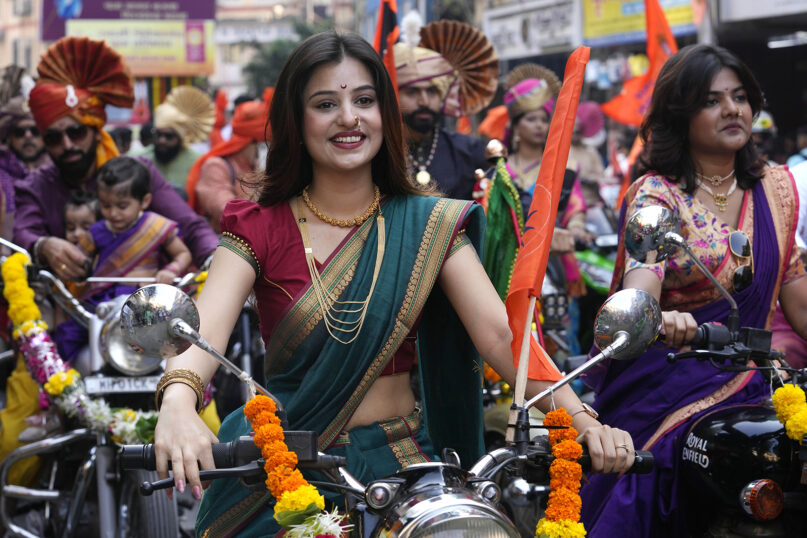(RNS) — For the past week, between April 9 and 15, South Asians celebrated the beginning of a new year with friends and family. Although originating in the Hindu luni-solar calendar — the Vedic auspicious month of Chaitra marks the beginning of a joyous new spring season and harvest — New Year celebrations have been adopted and adapted by religions and cultures across the Indian subcontinent.
Indians from all backgrounds celebrate according to their community’s socio-religious customs and unique calendars, from Ugadi for Telegus and Kannadigas in the southern states to the Gudi Padwa festival of western Maharashtra to the northern Assamese New Year celebration of Bohag Bihu, just to name a few.
And for those who immigrated to the United States from India, Bangladesh, Nepal or Sri Lanka, these New Year celebrations emphasize an important aspect of South Asian diasporic identity: the cultural heritage they share, rather than religious differences.
“It’s not just about crops,” said Sahej Preet Singh, a Sikh man from the northwestern state of Punjab, who moved to the United States in his 20s. “It’s not just about religion. It’s a lot more than that. It’s the culture, it’s the food, it’s that sense of belonging in the rest of the community, and all the communities coming together. It’s really about brotherhood.”
Singh, who now works as a community engagement manager for the Sikh Coalition, said that when he first immigrated, the loss of community was palpable. It was common for doors in his small town to be unlocked so friends could come and go without asking, but in an apartment in Queens, New York, he didn’t even know his neighbors. Holiday celebrations, like Vaisakhi, the New Year holiday in his Punjabi culture, have helped build a new diaspora community that is much more diverse.
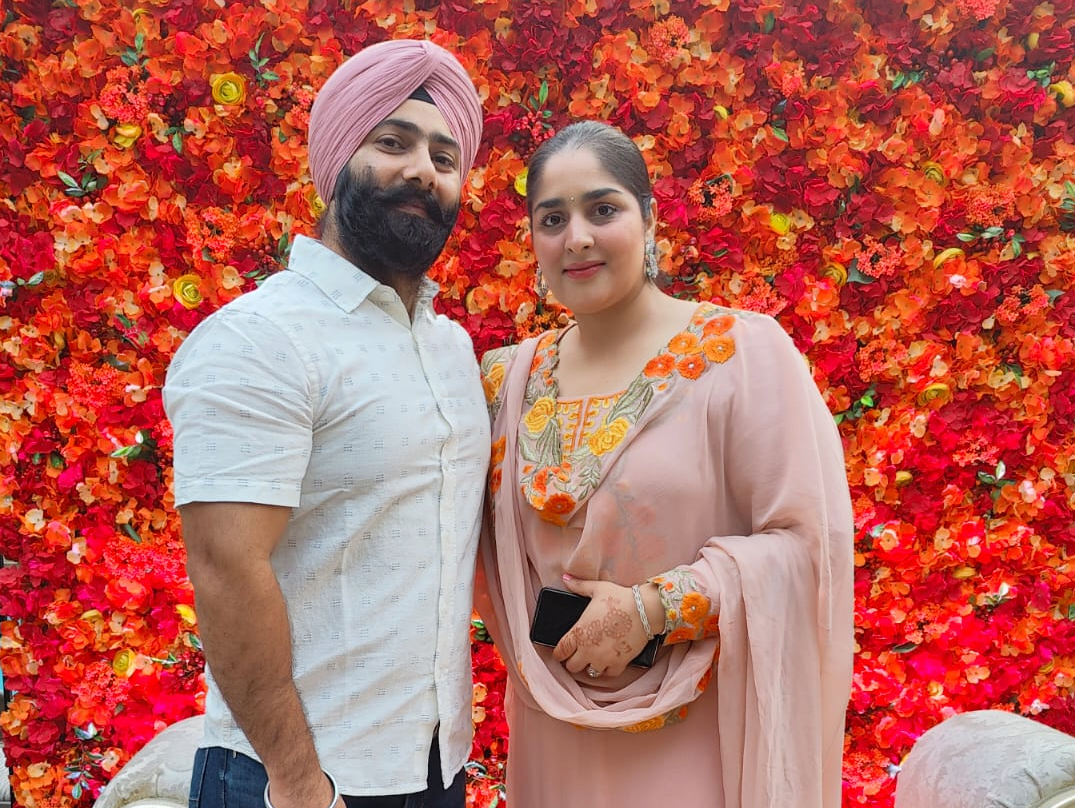
Sahej Preet Singh, left, and his wife Manveet Kaur. (Courtesy photo)
“Here, you might be able to see South Indians and Marathis and Punjabis and Gujaratis all celebrating Gudi Padwa or Vaisakhi,” said Singh, who fondly remembers his mother feeding him a dessert so the New Year would start off with some sweetness.
Vaisakhi, with its colorful processions, large langar meal at the gurdwara and melodious “kirtans,” or group devotional singing, marks the start of a plentiful harvest season for the farm-heavy land of Punjab and the establishment of the Sikh faith by Guru Gobind Singh, though it was a festival time for Punjabis of all faiths.
Moving here, said Singh, who is now in upstate New York, has allowed him to better understand the commonalities between Indians and South Asians as a whole, giving him a piece of home to hold onto. The new community he has formed in the United States, he says, is a reflection of the diversity that only a place like the U.S. can bring.
“I might see somebody on the street who might not be Punjabi but they might be South Indian or Marathi or Gujurati, and I will still probably make it a point to at least nod and say hi to them,” he said. “You know, even shared iftar dinners are becoming a big deal here now.”
Naznin Seamon, a Bengali poet who moved to Queens, New York, in 1997, wants to keep religion and culture separate.
“We have so many problems, so many issues, but these cultural events, these cultural things, they actually make us open our mind,” said Seamon, a Muslim from Bangladesh. “They help us flourish, help our creativity. And it is a source of joy.”
The New Year celebration of Pohela Boishakh, celebrated by ethnic Bengali people from India and Bangladesh, has its roots in the Mughal empire, when Muslim leadership decided to switch from the Arabic lunar calendar to the Hindu solar agricultural calendar to better reflect the harvesting of crops, thus marking a new tax cycle and accounting year.
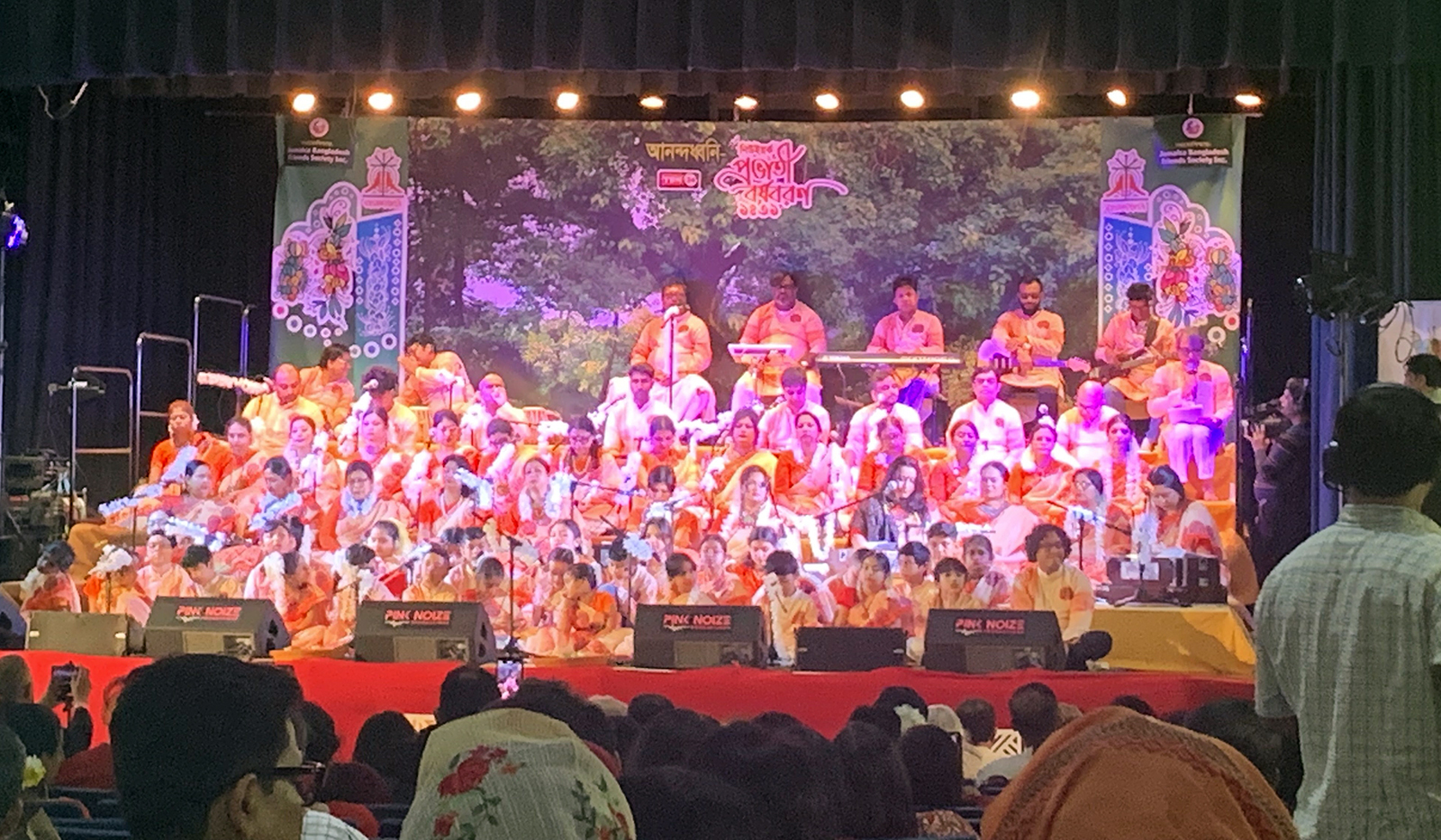
People attend a Pohela Boishakh celebration in Queens, New York. (Courtesy photo)
Some of Seamon’s fondest memories from Bangladesh, she says, were made during her town’s Pohela Boishakh festivities. She would look forward every year to donning a typical white and red sari, with bindi and flowers in her hair, to attend a colorful fair where she got to ride a Ferris wheel and look at photographs in a ViewMaster. Bengali Muslims and Hindus would sell their goods, including homemade animal masks that would be worn at a parade.
Though some would pray to Hindu gods for a bountiful and prosperous harvest, Pohela Boishakh is for all, Seamon says, despite a growing charge by some Muslim religious fundamentalists to discourage the sharing of a holiday they say is rooted in Hinduism.
“To celebrate any culture. I don’t have to follow that religion,” said Seamon, who is also a high school teacher. In Queens, she says the Bengali population is ever-growing, so much that she now teaches Bangla and is in charge of the Bangla Student Association at her school. The idea of celebrating Pohela Boishakh with her students, she says, is not only for them to “get off their phones,” but to appreciate the diversity of their parents’ homelands.
“Just because we came to a different country and we have so many opportunities doesn’t mean that I have to forget my own roots,” she said. “Coming to a new country is adapting and accepting, not changing my own identity, because every culture is beautiful in its own way.”
Kathirvel Kumararaja, a Hindu from Tamil Nadu in the south of India, is also seeking to help diaspora children take pride in their origins. He is the president of the more than 50-year-old New York Tamil Sangam — the first community organization for the ethnic and linguistic group in North America. The platform is for the “global Tamil community,” which stretches from India to Southeast Asia, to “share pride in belonging.”
“Starting from Indra Nooyi, Sundar Pichai, to the vice president of America, Kamala Harris — they’re all Tamils and come from the same tradition,” said Kumararaja, who is also the chair for the International Tamil Entrepreneur Network. “Starbucks CEO, FedEx CEO, you name it, they’re all Tamils. These kids have so many role models in society.”
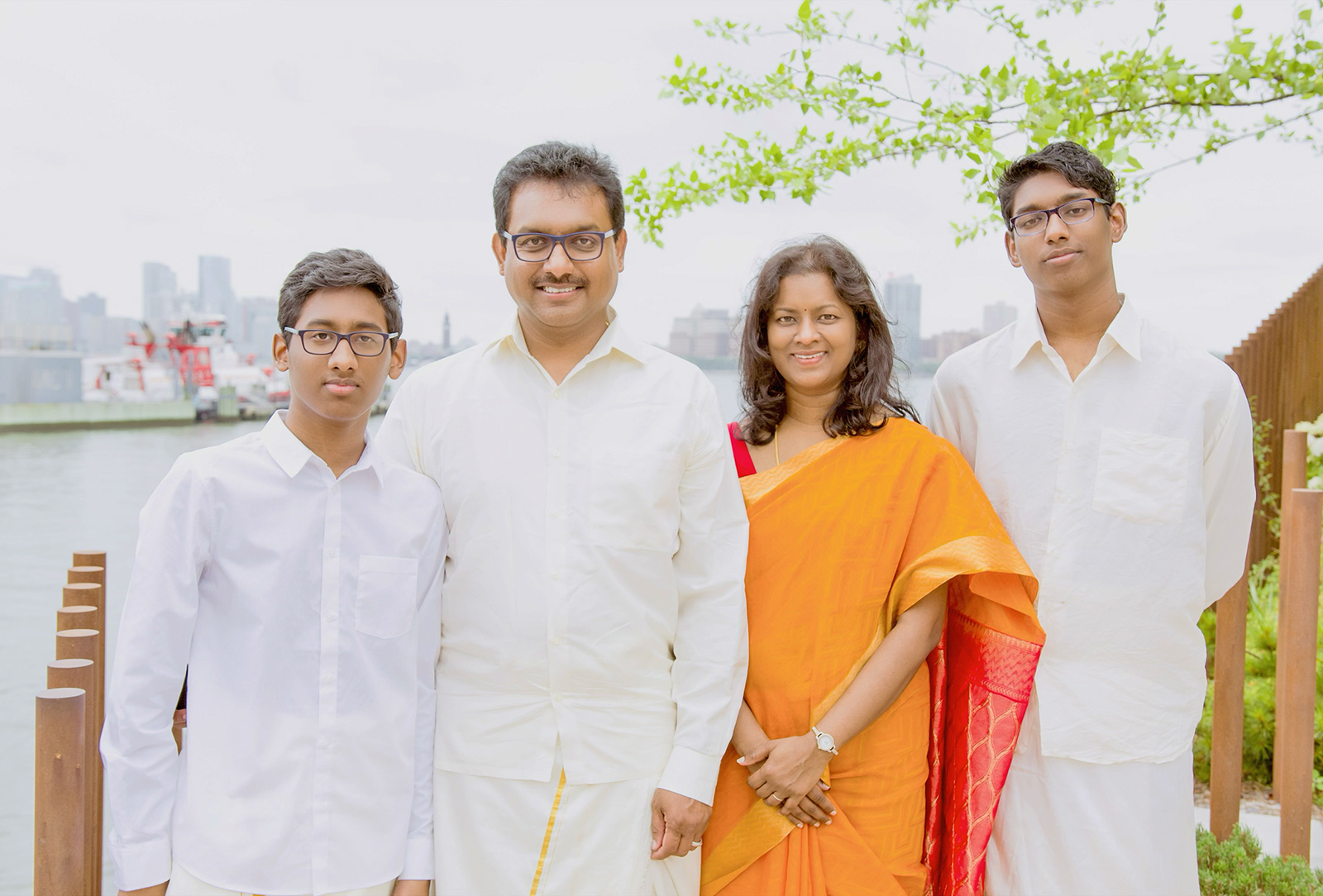
Kathirvel Kumararaja, second left, with his wife and children. (Courtesy photo)
Puthandu, the New Year holiday marking the beginning of the Tamil calendar and month of Chitterai, is a time for family, according to Kumararaja, who is married to a Tamil Christian. Kids and parents arise at the same time, laying eyes on a mirror in which they can see an abundant tray of fruits, flowers and coins, as well as a dish of raw mango, tamarind, jaggery and neem leaf, which they eat “just to show that life is sweet and sour.” Everyone prays together, seeks blessing from their elders and eats typical Tamil delicacies to bring in a prosperous beginning.
And importantly, the holiday is a public observance back home for all Tamil people, whether they are of Hindu, Christian or Muslim background. Like other ethnic New Years, including Chinese New Year, he says, many people don’t necessarily look at the Scriptures to find a reason to celebrate. It is a joyous time for all, reflected in his New York organization’s celebration with musical performances from popular Tamil singers.
“Typically, acculturation happens in American society in the name of freedom,” he said. The community festivals, he said, are one way to “show our kids what our culture is about and what are the values that we as Tamils represent. We don’t have to be shy about our culture or identity.”
Appen Menon, a board of trustees member for the Kerala Center of New York, understands this multi-religiosity. Hailing from the southern state of Kerala, where Christianity and Islam are widely practiced, Menon’s organization is no stranger to hosting combined cultural and religious events, like Easter and Vishu celebration.
“It’s a great feeling that we have people from diverse backgrounds from Kerala here, and we all celebrate all the celebrations including religious holidays together,” said Menon. “Although we are away from home, we found a home here.”
Vishu, the New Year holiday of Malayali Hindus marking the defeat of demon Narakasura by Lord Krishna, begins before dawn, when devotees make sure to lay their eyes on an idol of Krishna and a plate of abundance first thing after they wake up. Families then bathe, eat a sweet dish, go to the temple and finish the celebration with a sumptuous lunch feast.
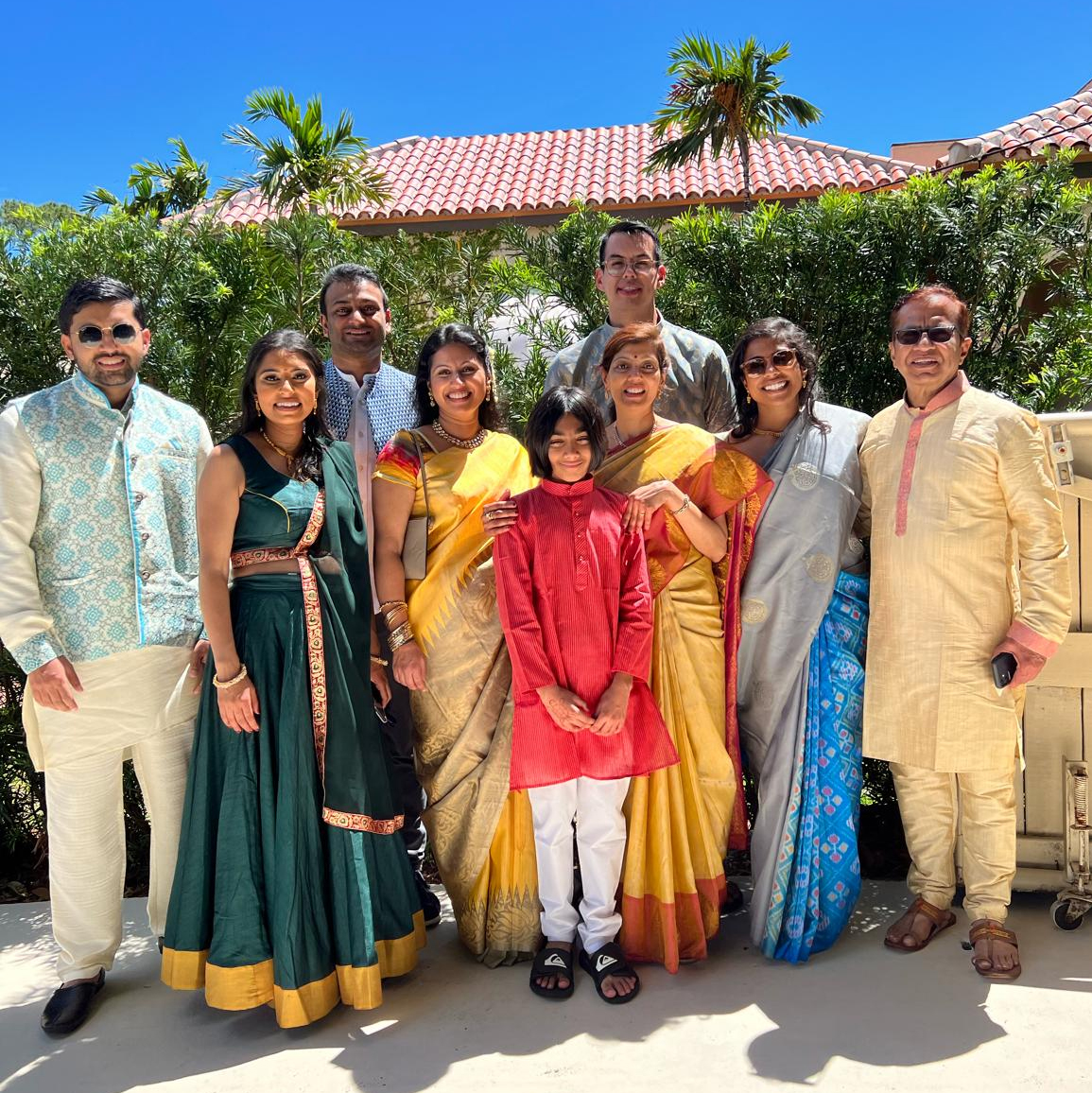
Appen Menon, right, with his family. (Courtesy photo)
While the scale of celebration cannot be the same in the U.S. as it is in Kerala, Menon, an attorney, says there are still benefits from forming new traditions. He and his family never celebrated Diwali, the well-known Hindu festival of light, in the same festive way of North Indians, but here, they are able to join in.
“While you’re in India, you know, you don’t see too many people from other states,” he said. “You see mostly people from Kerala and you are not exposed to those kinds of celebrations. Here, we are. And in a big way or small way, we also participate.”
After a delicious feast made by his wife, which he says he “can claim he helped with,” Menon says it’s time for a nap and a reflection on the new year.
“Back in India, when I was growing up, I didn’t know too much Hindi,” he said. “But I heard this phrase: ‘Alag bhasha, alag vesh, phir bhi apna ek desh.'”
Different language, different dress, still a country of our own.
